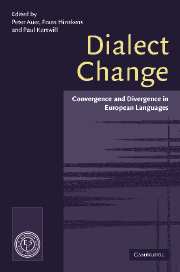Book contents
- Frontmatter
- Contents
- List of maps
- List of figures
- List of contributors
- Preface
- Map
- 1 The study of dialect convergence and divergence: conceptual and methodological considerations
- Part 1 Convergence, Divergence and Linguistic Structure
- Part 2 Macrosociolinguistic Motivations of Convergence and Divergence
- Part 3 Microsociolinguistic Motivations
- 11 Subjective factors in dialect convergence and divergence
- 12 How similar are people who speak alike? An interpretive way of using social networks in social dialectology research
- 13 The role of interpersonal accommodation in a theory of language change
- References
- Index
11 - Subjective factors in dialect convergence and divergence
Published online by Cambridge University Press: 22 September 2009
- Frontmatter
- Contents
- List of maps
- List of figures
- List of contributors
- Preface
- Map
- 1 The study of dialect convergence and divergence: conceptual and methodological considerations
- Part 1 Convergence, Divergence and Linguistic Structure
- Part 2 Macrosociolinguistic Motivations of Convergence and Divergence
- Part 3 Microsociolinguistic Motivations
- 11 Subjective factors in dialect convergence and divergence
- 12 How similar are people who speak alike? An interpretive way of using social networks in social dialectology research
- 13 The role of interpersonal accommodation in a theory of language change
- References
- Index
Summary
Objective and Subjective Factors in Language Variation and Change
Since the 1960s new technologies for registering and analysing spoken language have greatly advanced our theoretical and methodological understanding of the many and complex factors involved in language variation and change, including the physiological constitution of our speech organs, the mental capacity of our brains, the structure of linguistic varieties, the linguistic context of particular variables, the social embedding of variation, and the social evaluation of variants and varieties. These factors are commonly divided and grouped in various ways: internal versus external; linguistic versus social versus (socio)psychological; macro versus micro. All of these divisions reflect important aspects of variation and change.
However, if we want to answer the why question of variation and change, the fundamental distinction is between necessary and sufficient factors. All the aspects listed above are necessary factors in language variation and change, in the sense that they are always involved. But it is our contention that only the sociopsychological, subjective factors can constitute the driving force behind such processes. In that sense, they alone are the sufficient factors. Language is a social phenomenon. Without users (in the plural), there is no language. The purpose of language is to contribute to the social construction of reality, including the transmission of collective experience from generation to generation. Languages are not plants with lives of their own, they are tools. Whenever these tools are the objects of tuning or adjustment, it is so because it serves human purposes.
- Type
- Chapter
- Information
- Dialect ChangeConvergence and Divergence in European Languages, pp. 287 - 302Publisher: Cambridge University PressPrint publication year: 2005
- 12
- Cited by



